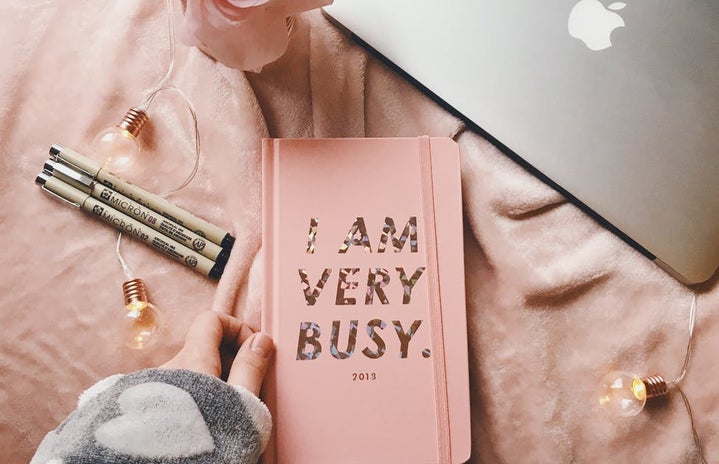As college students, we tend to fill up our schedules to the brink of our glasses, as if we are one drop away from spilling over. We are expected to balance homework assignments, co-curriculars, internships, work studies, athletics, performances, volunteer work, etc. while also having a social life, making time for ourselves and self-care, eating 2-3 meals a day, and getting an adequate amount of sleep.
Though students at DePauw all have very distinct and individual interests, something that appears to be common across the student body is how these students allocate their limited time through necessary multi-tasking and/or consecutive scheduling of To-Do tasks. Take a look at writers and editors for The DePauw, staying up late and working diligently until the newspaper is perfect for printing. Still in the PCCM, production managers for D3TV constantly re-shoot and re-edit their clips to form a cohesive, meaningful story for their series. Over at the GCPA, School of Music students are holed up in practice rooms perfecting their pitch and making sure their notes don’t fall flat.
Then, you have student-athletes constantly working around their practice schedules, whether that be waking up at 5 AM for swim or rushing from track practice to their sorority chapter meeting. You’ll see art students with dried clay on their calloused fingertips working until their arms feel numb at Peeler, political science majors, and Management Fellows spending half of their days at the Hubbard Center scavenging for internships in Washington D.C., and interns at the Prindle Institute preparing for moral reasoning workshops. In Julian and Olin, you’re likely to find pre-med students constantly rearranging their four-year plan to try to fit in a time for studying abroad while also studying for the MCAT. In Julian and Asbury, STEM Guides and Academic Resource Center tutors are attempting to assist other students while studying for their own exams and writing their own essays. Student leaders are seen re-activating and attempting to revive their student organizations that fell during COVID-19.
International students and domestic students of color can be observed trying to find their own sense of identity and community in a predominantly White institution by creating cultural clubs. Civic Fellows and Bonner Scholars may spend their weekends volunteering, and ITAP interns may spend their weekends testing software. Resident assistants are basically working around the clock, from settling roommate disagreements to addressing the shortcomings of their residence halls. DePauw Student Government is seen trying to organize their limited budgeting while also working toward enacting substantial change on campus. First-year mentors schedule in time to periodically check in on their mentees while possibly neglecting to check in on themselves.
In the same breath, mental health and wellness peer educators may be creating programs to raise awareness for Counseling Services while barely having time to schedule their own therapy appointments.
Let’s not forget our seniors, who are practicing for their research poster presentations, writing their theses, and applying to graduate school, all while trying to find closure in their undergraduate years and accept that they probably won’t see the new and improved Roy O. West library.
The average student may be replacing their sleep for Starbucks and Café Allegro stops, napping during their one-hour time block between classes, and scheduling their meals throughout the day to make sure they eat. Then, to unwind, you’ll find some students setting up a movie marathon and other students spending a night out before waking up for their 8:30 AM labs. Some students may even be laying on their carpet for hours, dissociating, as a way to procrastinate their priorities. Students debate whether or not they should utilize their 2-hour time slot after classes and before practice to go on TikTok or work on their assignments due at 11:59.
That’s the biggest thing I’ve noticed: exchange. Students often feel that they have to sacrifice one thing for another– either catching up with an old friend or cramming in time to practice for their French oral exams, either sleeping or staying up late to finish their Neuroscience lab report, either painting their nails or working on Anthropology research. Sometimes, I notice a lack of exchange – with the multiple student types I’ve listed, I know there are students who can relate to several of these roles as if they are unable to exchange one role for another and must take on multiple.
I wonder if it has always been this way. Or, I wonder if it has something to do with the pandemic – if people are now overscheduling, overbooking, overworking themselves because they finally can. I wonder if they’re attempting to make up for the lack of productivity during lockdown.
When people say that you are defined by how you spend your time, people automatically assume that that implies that you are defined by your productivity – by how much you have accomplished, by academic validation, by being able to log in how many hours you spent at your internship. There are various interpretations as to how one can define themselves – their background, how they grew up, and how they choose to carry on. Maybe we’re defined by the relationships we develop, maintain, and lose, and how much time and effort we put into those relationships. There is no single answer.
And this word-vomit/jumble of thoughts and observations about myself and others do not contain the answer to this. Hopefully, though, it encourages you to think. Think about what’s truly important to you. Think about what makes up your personality. Think about what you want to be known and remembered for. Think about what you want to prioritize. Think of all of the relationships you missed because you were studying somewhere. But, also, think about all of the essays you could have written a better conclusion for had you spent more time on them. It’s about balance, and everyone has a different balance they need to create for themselves. There is no single answer for how to make good use of your time, though thinking about balance and pacing could aid in brainstorming potential individual answers for yourself.
“It’s not just one hour, it’s a whole year that’ll disappear.” – “Pied Piper,” Love Yourself: ‘Her’


